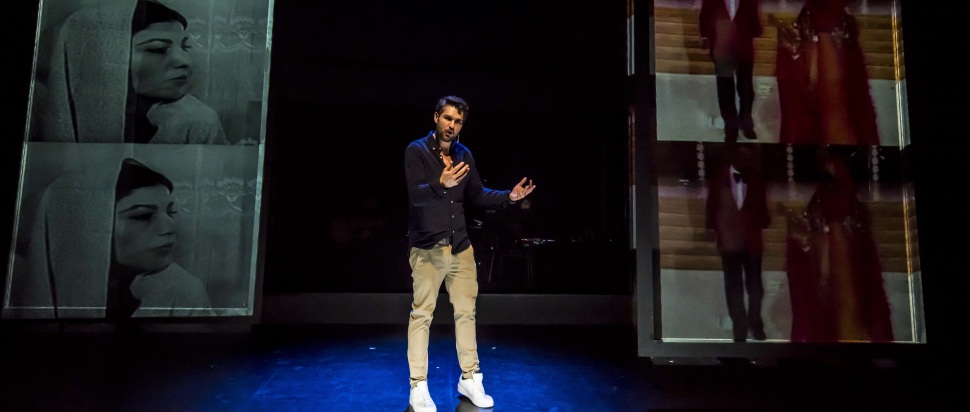Audience Accountability at the Fringe
Two Asian-led Fringe shows create a dialogue between identity, accountability, and labour
If you ask an audience what lies in the centre of a Venn diagram between dramatic lectures, Fringe shows, and theatre about race, the likely response skirts around the lines of an experience that makes you feel as though you’ve missed something. You’re not the right person for this; this is effort, not entertainment: you’re guilty; flustered; thirsty; bored with the effort of what halfway through can start to feel like spiritual community service. The presumption is listening and learning: showing respect for someone’s lived experience by being studious, as though you’re making up for the fact that white people have been, historically, proudly resistant to listening and learning.
This year’s Fringe, however, brought two shows to the fore that suggest that theatre about race (specifically Asian theatre) is changing tack: there’s a new game, a different approach; a wild inventiveness, and a whole new role for the audience. These shows are Pickle Tank Theatre’s 4/4/4 (4 Real Asians, 4 White Men, 4 Fake Asians), fresh from its sold-out New York run, and Things Hidden Since the Foundation of the World, the final piece in Javaad Alipoor’s genre-busting triptych of plays that both skirt and skewer Asian representation and identity. Both productions steady their aim at truth: one on the truth of an experience, the other on the truth of how we understand another’s experience.
Interestingly, 4/4/4 presumes an Asian-majority audience, and Things Hidden… a white-majority audience, which pointedly exposes the audience to various modes of ‘belonging’. This sense of identity is felt particularly strongly in 4/4/4’s stylistic bones: its epic theatre hallmarks feel occasionally jarring or out-of-sync in a (Western) context where culture is naturalistic as standard. The awareness of how loudly these references would resonate for non-Western audiences accustomed to non-naturalistic artistic styles only emphasises the sense of an audience being behind from the get-go, and of the relentless exhaustion of effort to come.
Both plays work satirically on the presumption that we’re living in a post-racial world; they spin through notions, fancies, and styles in order to try to ‘solve’ the question of how to live now, either as an Asian person or as a white person who ‘tries’. There’s something to be said for the Everything Everywhere All At Once effect here, as absurd set-ups become loaded with meaning, and the characters at the centre of these plays struggle to stay afloat amidst the pace and the speed of the action happening around them. There’s a mock murder-mystery podcast (Things Hidden…), a faux sitcom (4/4/4), circus shows turned upside-down, and lectures that dissolve and deceive.
Overwhelm – directional, pointed – seems to be the name of the game here. 4/4/4 is about the exhaustion of Asian performativity: even supposedly joyful acts of racial subversion have emotional tolls that are plumbed too often, too extremely, too naïvely; we are implicated guiltily if white, pressured to sympathise on all sides if Asian. Things Hidden… acknowledges that attempts to understand a lived experience are exhausting and misleading: there are too many conflicts of significance, and too strong an assumption that translation is a complete act – that understanding is entirely, comprehensively, Googleable. This production presumes not only an audience's whiteness but also its low-effort goodwill: it holds both laziness and impossibility, and acknowledges that these things co-exist as barriers.
Both shows rely heavily on the audience’s sense of being seen and involved. 4/4/4 warns us that we are being broadcast on a syndicated screen and recorded, as if as part of a damning testimony, whereas Things Hidden… weaponises our confidence in our own racial awareness. We are ‘seen’, constantly, in the comparisons we use to try to make other experiences seem accessible by meeting us at our own points of reference. There’s an equality of action here that is unique to theatre: we are both watching and watched, our relationship to the stage action constantly changing in a way that gives us access to the exhaustion propelling the characters on stage.
These productions aren’t here to preach the correct way to tackle the question of race: they don’t presume that people of colour hold answers, or should have to hold answers. Instead, they insist upon our participation in the highs and lows of living and understanding experience – they insist that we understand how easy and exhausting it is to forget who you are. This is not so much a destruction of the white gaze, but rather a sense of being watched back: the honesty and imperfection of racial politics here are, if not a solution, a compelling provocation for theatre to come.
4/4/4 (4 Real Asians, 4 White Men, 4 Fake Asians), theSpace @ Niddry Street, run ended
Things Hidden Since the Foundation of the World, Horizon Showcase, Traverse Theatre, run ended
This article was produced as part of Diverse Critics, a talent development programme for disabled and/or Black and people of colour arts writers delivered in partnership between Disability Arts Online and The Skinny and supported by The National Lottery through Creative Scotland
